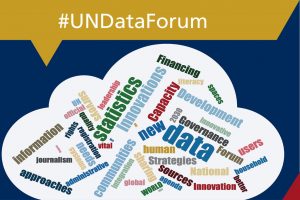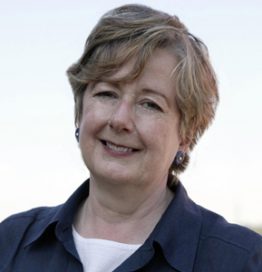
A review by Phyllis Macfarlane
“The Missing Millions” and “Using Data to Understand People’s Values Priorities and Desires” were the two sessions were the ESOMAR Foundation took stage!
I was very fortunate recently to represent ESOMAR Foundation and Paragon at the United Nations’ very first UN Word Data Forum (WDF) which was held in Cape Town in January.
So what is the WDF? Here’s the official version: Following one of the main recommendations contained in the report entitled “A World That Counts” , presented in November 2014 by the United Nations Secretary-General’s Independent Expert and Advisory Group on Data Revolution for Sustainable Development, the Statistical Commission agreed that a United Nations World Data Forum on Sustainable Development Data (UN World Data Forum) would be the suitable platform for intensifying cooperation with various professional groups, such as information technology, geospatial information managers, data scientists, and users, as well as civil society stakeholders.
So, basically it was a very big (enormous, in fact!) conference, attended by practically all the world’s National Statistical Offices, plus everyone else who is interested in the world achieving the UN’s 2030 Sustainable Development Goals, with the objective of getting everyone to collaborate and cooperate better, in order to achieve the goals.
Let me set the scene for you…
- There were 1500 + delegates, all extremely diverse in terms of nationality and job profiles (and gender!)
- It was held in the Cape Town International Convention Centre (CTICC – sorry for the number of acronyms in this post!) – which had an ‘enormous’ auditorium for Plenary sessions
- There were lots of very senior and illustrious attendees from the UN, and from every National Statistical Office (NSO) in the world.
- The NSO’s were probably the most numerous amongst the delegates
- The NSO’s in general are rather anxious about the measurement demands of the Sustainable Development Goals (SDG’s): 17 goals, 169 targets, 230 indicators. ie 4x the work compared with the old Millennium Development Goals (MDGs)! – but with no sign of increased budgets. As you can imagine – this led to a lot of discussion about capacity building.
- The very major theme from the UN was that the NSO’s can’t do this alone – collaboration and partnership were the key words which were repeated over and over again – the NSO’s need help from NGO’s, Civil Society and the Private sector (ie people like us!). But they are clearly rather frightened of this prospect, not having a lot of experience of collaboration with the outside world – and perhaps a little sceptical as well?
- There was an awful lot of talk of the ‘Data Revolution’: Government has so much data now – it can be used for good – to serve the people.
- In general there was huge optimism from the senior UN and major country Statisticians about SDG’s: getting rid of inequality, using data for the public good – that there is a way forward, but they recognise that it will mean change – for the NSO’s, for everyone.
What was the Conference all about?

It was a 3 day conference, and each day there were 2-3 Plenary sessions, plus 3-4 parallel sessions of 6 separate themes or streams (so each separate stream session was attended by 100-200 delegates!)
The six pre-defined nominated themes or workstreams were as follows:
- New approaches to capacity development for better data
- Innovation and synergies across different data ecosystems
- Leaving no one behind
- Understanding the world through data
- Data principles and governance
- The way forward: A Global Action Plan for Data
And of course there was lots of networking, and an extremely lively conference dinner!
What did we actually do there?

Representing ESOMAR Foundation and Paragon, I took part in 2 Panel sessions – one in the ‘Leaving no-one behind’ stream – which is a general call to action from the UN to help the poorest everywhere. We did a session on ‘The Missing Millions’, where we discussed how we could measure these difficult populations (eg Street children, the homeless, people living in institutions, people displaced by conflict etc etc – not an easy task!) and further understand how to help them through real research to fully understand their situation. Our audience here was mainly NSO’s and they were rather sceptical about: How were we actually going to do it ie quantify the populations? Was there political will to do it? And where was the funding going to come from? All excellent questions – we had a good and lively debate!

And the second panel that I participated in was in the ‘Understanding the World through Data’ workstream – we conducted a session entitled ‘Using Data to Understand People’s Values Priorities and Desires’. Basically we were arguing for attitudinal and qualitative data to understand how to guide more effective actions. Actions which take account of what the actual people think. After all we have very appropriate skills to apply! Here our audience was mostly NGO’s and Civil Society, and they were very supportive and enthusiastic about the arguments – so we had another excellent debate!
Altogether, every session I went to was interesting, informative and full of passion.
The messages I heard most consistently throughout the 3 days were:
- A reluctance to move away from ‘hard’ statistics on the part of NSO’s (and the UN Statisticians – note that only a handful of the indicators are perception based)
- A recognition that the NSO’s must innovate and modernise
- That data quality is very important
- Collaboration, collaboration, collaboration – ‘we can’t do it by ourselves’ – so collaboration is being proposed to the NSO’s as the only way that the goals will be achieved
- Coordination – to share ideas and avoid proliferation of work
- Open-ness: sharing of ideas and experience, partnerships, dissemination of data for SDG’s. Government data is public property.
- Dis-aggregation: a new realisation that data is only really useful if it can be disaggregated eg by gender, region, income level. (Data must be accurate, timely, disaggregated)
All very realistic and thought provoking ideas.
Overall…
Every session I went to – whether it was about Data Journalism, geo-mapping, whatever – was extremely interesting. Everyone was passionate, enthusiastic and innovative.
But after all, if you are with 1500+ people who all want the world to be a better place – you are going to be inspired!
And I certainly was. The issue is to engage with this audience and get our voice, as market researchers, heard.
I came away having made contact with people that I had only spoken on the phone to before, with lots of new contacts, and many ideas for projects to start us to have a bigger impact.
Watch this space!!!

Phyllis Macfarlane is a Member of the Board and Treasurer of the ESOMAR Foundation
